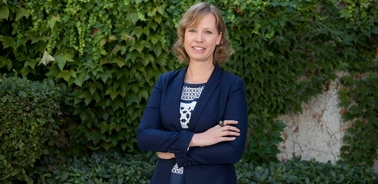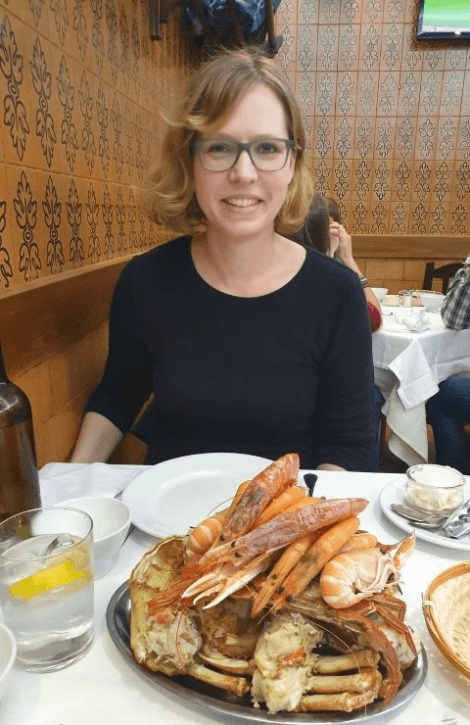- Home
- News And Events
- What’s Going On
- Faculty Spotlight: Bernadette Bullinger
Faculty Spotlight: Bernadette Bullinger

Meet one of IE Business School’s most influential thought leaders.
IE Business School Professor Bernadette Bullinger is more than just a super teacher. It’s true she has received teaching recognition awards every semester with student evaluations raving about her classes since she joined in 2018. But, she is also a vibrant part of the research community—including stints at Stanford University and University of Alberta as a visiting scholar.
She is an acting member of the Organization Theory Research Group (OTREG), New Institutionalism Network (NIW), and European Group for Organizational Studies (EGOS)—and sits on the editorial board of the German Journal of Human Resource Management. She won Best Paper Award of the Journal of Global Mobility-- in addition to a handful of grants from Spanish, Austrian and European agencies. Bullinger has published articles in a range of top publications like Organization Studies, Journal of Management Inquiry, British Journal of Management and others. Her recent research stands out as some of the timeliest and appropriate work associated with the current work climate. Specializing in Human Resource Management, her work touches on frontline workers, migration and questions of legitimacy in the context of recruitment—in addition to the impact of international experience on career aspirations.
Meet one of IE Business School’s top researchers:
What brought you to IE? Where were you before?
A friend and colleague at the University of Innsbruck, where I previously was an assistant professor, told me many good things about IE. I initially came for a research visit and later for teaching a course as an adjunct. I liked that IE provides such a stimulating environment for ambitious research and innovative teaching. I fell in love with Madrid and its inhabitants, one in particular! Before applying for an assistant professor position, I had the chance to get to know IE better during a 1,5-year research grant stay. That’s the story how I changed Tyrolian Knödel for Spanish tapas.
Have you ever had an a-ha moment while teaching that furthered your research? What was it?
Ever since teaching my first class at IE, I found the cultural diversity and variety of nationalities of our students impressive. I noticed how some really had difficulties to say where they are from since they grew up in so many different places. And these international experiences really have a huge impact on how students are engaging with each other and with the topics I’m teaching. My colleague Isabel de Sivatte had started a research project on expat kids and I joined her. We are also currently working on another study where we explore how extensive international experience influences students’ career aspirations. We conducted qualitative interviews and focus groups and the stories that our students share are truly remarkable. I’m very grateful for being able to link research and teaching in that way.
What book do you wish your students would read before taking your class and why?
Rather than recommending any specific book that relates to human resource management (HRM), the topic of my class, I wish they’d read The social construction of reality by Peter Berger and Thomas Luckmann. When I read this book during my studies, it really blew my mind. This sociological classic questions everything that we think we know. It outlines how all social facts are just assumptions that people have agreed on and that over time became taken for granted. In HRM there are numerous examples. Identifying certain employees as “top potentials,” for instance, will actually lead to them receiving more attention and resources, in turn contributing to them being successful. The example of using data analytics in HRM is construction of reality in the making. Companies are now establishing which data are used and how, which – I believe for better or worse – will soon become our benchmark for progressive HRM and modern companies.
Please name one of your articles you feel addresses the most important issues in 2021 for IE alumni?
Over the past years, I’ve been studying everyday challenges for frontline workers such as medical professionals and sales assistants. The pandemic has reminded us of the importance of these frontline workers who directly provide services to customers, clients, or patients. However, we also heard accounts of management, e.g. hospital managers, being extremely insensitive or even cynical towards the needs of frontline workers. IE students and alumni are more likely to be in the position of the manager than in the position of the frontline worker. What I hope that they could take away from these two articles is a deeper understanding and sensitivity for the everyday problems and tensions that frontline workers face.
Whose research of your IE colleagues do you find interesting? Why?
Besides the interesting research of my colleagues in the Human Resources and Organizational Behavior department, I enjoy the interdisciplinary insights that being part of IE’s Business and Society Research Group (BSRG) offers. For instance, Stefanie Beninger (Marketing) has been doing important research on the role of marking in society, studying resilience and the impact of businesses on communities. Together we are currently studying migrant business owners and resilience. Antonio Aloisi (Comparative Private and Business Law), also a member of BSRG, has focused on the legal side of machines, artificial intelligence and platforms. His work on algorithmic decision-making at work provides insights into the future of work.
Tell us one personal thing about yourself that none of your students knows. A hobby, sport or talent? Strange fact? Unusual interest?
During my studies in Vienna – besides business administration, I also studied philosophy and German language and literature – and I worked as a book critic for children’s and young adult books. My specialties were coming of age and fantasy books.
